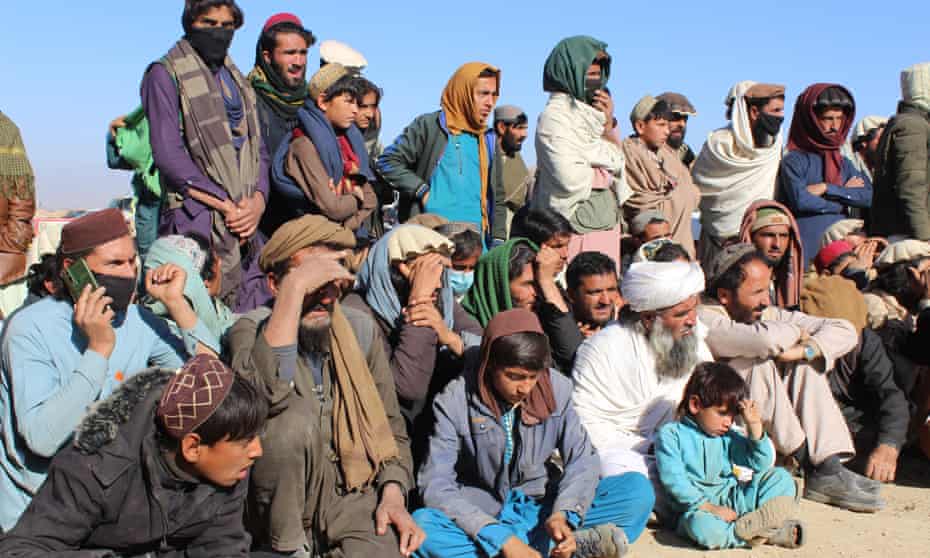Covid has aggravated a crisis in the global humanitarian system, and an ineffective UN is being sidelined

So look away now, if you wish, because much of the world beyond the inoculated shores of Europe and America presents a very disturbing picture. The pandemic has coincided with, and greatly exacerbated, a crisis in an already struggling international humanitarian system. Existing weaknesses and long-neglected problems are ruthlessly exposed.
The resulting, worldwide crescendo of suffering, extreme need and sheer misery is now reaching its highest-ever pitch. And Covid is only part of this story. Unmediated conflicts, endless civil wars, climate-related disasters, state lawlessness, impunity and ineffective diplomacy are leading to hunger, disease and displacement on an unprecedented scale.
It’s a universal scream of pain and fear the like of which even Edvard Munch never imagined.
The latest emergency watchlist from the NGO International Rescue Committee (IRC), shows that a record 274 million people will need humanitarian assistance in 2022 – a 63% rise over the past two years. A record 80 million people have been forced to flee their homes; 41 million people are on the brink of famine. As ever, everywhere, women and girls suffer disproportionately.
The 20 crisis countries identified by the IRC as most at risk of further deterioration – a list which is topped by Afghanistan, Ethiopia and Yemen but also includes Myanmar, Syria and another 11 African countries – account for a startling 89% of all global humanitarian need and 80% of all refugees.
The UN’s refugee agency says that despite calls, largely unheeded, for a Covid-related global ceasefire and curbs on cross-border movement, mass displacement continues to grow. It’s estimated at least 1% of the world’s population – one in 95 people – has been forcibly displaced, compared with one in 159 in 2010. This puts cross-Channel migration in much-needed context.
The Disasters Emergency Committee, an umbrella group of 15 leading UK aid charities, last week launched a crisis appeal for Afghanistan, where 8 million people are at risk of starvation this winter, including about a million children. It raised a laudable £9.5m in the first 24 hours.
But the bigger picture is daunting. Unicef is seeking a record $9.4bn in worldwide emergency funding in 2022 to help 177 million children affected by humanitarian crises, climate change and Covid. In total, the UN says, a whopping $41bn will be needed across 63 countries. Such targets will be hard to reach.
David Miliband, the former UK foreign secretary and president of the IRC, says this extraordinary global emergency is not the result of a sudden, unlucky collision of unfavourable factors. It has been brewing for years. He argues that the humanitarian crisis is rooted in a political crisis – what he calls “system failure”.
This failure has several aspects. More and more states fail to fulfil their responsibility to protect citizens – and some, such as Syria and Myanmar, attack them or treat them as hostages.
Like liberal democracy in general, diplomacy and peace-making are in retreat. Civil wars are more numerous, last longer, are internationalised through proxy forces, and are harder to resolve.
The failure is legal, too. Universal rights and treaties are disregarded. International law is less respected than at any time since the UN was created in 1945. The consequences are a growing incidence of war crimes, crimes against humanity, genocide – and, for perpetrators, a lack of accountability bordering on impunity. Think of Russia’s invasion of Ukraine or the Saudi bombing of Yemen.
The international aid apparatus is also breaking down, and not only through insufficient donor support. It’s shocking that Britain chose this worst possible moment to cut overseas assistance. Problematic, too, is the politicisation of aid. “Aid is being instrumentalised, to serve the needs of those giving not those receiving,” Miliband says. Aid workers face record violence. Aid, or its denial, is used as a weapon, as in Tigray.
How to reorder a world in which conflict drives extreme poverty, hunger and people becoming refugees, where great powers compete rather than collaborate even in a pandemic, where unchecked climate change wreaks havoc, and where the UN security council – the ultimate guardian of global law and order – is blocked and circumvented by veto-wielding permanent members?
One way to ensure improved accountability is greater use of universal jurisdiction by national courts – witness the recent successful genocide prosecution in Germany of a former Islamic State member. Another is to suspend the veto power of the five UN security council permanent members in the case of mass atrocities in crisis states, as France (which like Britain has a veto) proposes.
This would potentially stop Russia, for example, blocking inquiries into chemical weapons attacks in Syria, or China protecting Myanmar’s genocidal generals.
Such an agreement, overseen by an independent panel, might also in theory allow a full investigation of civilian deaths at the hands of US forces in Iraq, Afghanistan and northern Syria.
“We need to break global gridlock on the UN security council when it comes to mass atrocities, because only the UNSC can mandate peace envoys, enable UN sanctions, implement arms embargoes,” Miliband said in a speech last week. “The sidelining of the UN is a threat to global peace and security.”
The world is on fire, of that there is no doubt. Yet if the – hopefully precedent-setting – French plan is to work, China, the US and Russia must join the firefighters.
And that in turn requires them – and others – to set aside national self-interest and look beyond their own front door.

Leave A Comment